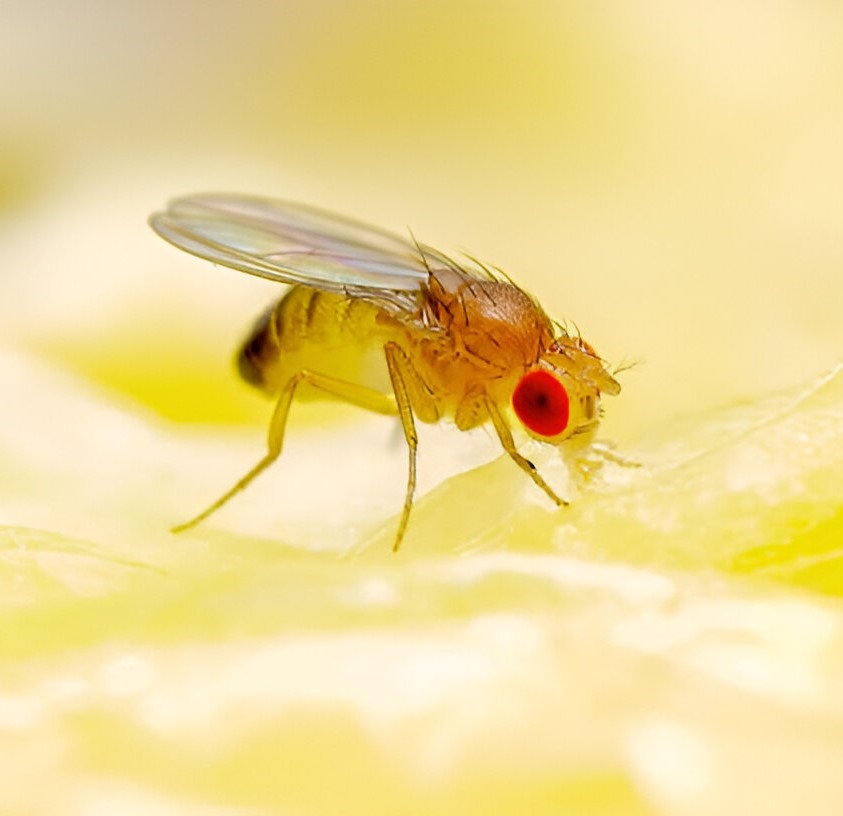Fruit flies can appear quickly, as anyone who has ever left a wine glass or a ripe peach on the table can attest. At first, you see only one or two, flying around quietly. By the next day, many more are buzzing around your fruit bowl, sink and even the trash can. Despite their small size, their persistence makes them unavoidable.
Fruit flies are unsanitary, even though they do not bite or sting, and their presence often indicates that there is something in your home that attracts them.
Their rapid reproduction is the reason they appear out of nowhere. One fruit fly can lay hundreds of eggs, which hatch within a day. Within a week, there is already a whole new generation of flies in the air. As a result, a problem that seems small one day can be very large the next. The good news is that you can break the cycle and eradicate fruit flies for good with a few simple adjustments to your daily routine, some cleaning and a few natural remedies.
In this blog, we discuss the origins of fruit flies, their habits that allow them to reproduce so quickly and the best methods to control them, including natural traps and preventative measures.
Why fruit flies appear in the home
Overripe fruits and vegetables
Overripe produce is the most common cause of fruit flies in the home. As soon as they start to get soft, melons, tomatoes, peaches and bananas become favorites. Even if a fruit still looks good, the fermentation process may have already begun and flies are immediately attracted by the smell. One forgotten apple can produce dozens of flies within a few days, as they often use the fruit as a place to lay eggs after they land.
It’s not just the countertop that has this problem. Groceries left lying around after shopping or even a fruit bowl in the living room can act as a magnet. It is best to carefully inspect all your fruits and vegetables and remove anything that seems overripe if you see flies collecting.
Trash cans and recycling garbage cans
Fruit flies don’t need much to survive and often find what they need in your garbage cans or recycling bins. An unwashed wine bottle, the bottom of a juice box or a discarded fruit peel can all be breeding grounds. Even if garbage is disposed of properly, flies can be attracted to the smell only if the bins are not emptied regularly or if leftovers are left behind.
Therefore, it is important to not only empty trash cans every day, but also wash them with warm soapy water. It is also a good idea to rinse recycling bins before throwing bottles or cans into them, as even a small, sticky drop of wine can attract them.
Damp surfaces and drains
One of the most troublesome features of fruit flies is that they often breed in unexpected places. The ideal place for their eggs is the organic material found in sinks, sinks and even damp sponges and mops. This explains why flies can still be present even after you’ve cleaned all visible surfaces.
One way to remove hidden residues is to pour boiling water or a mixture of vinegar and baking soda down your drains once a week. You can also break their reproductive cycle by regularly replacing your sponges and cleaning cloths thoroughly.
Soil and houseplants
Fruit flies can sometimes be seen near houseplants, although they are often mistaken for fungus gnats. Rotting leaves and excessively wet soil combine to create an organic, moist environment that attracts them. The result is the same: persistent insects that reduce comfort in your home, even if the flies in this case are not always of the same species.
Watering plants only when necessary, letting the soil dry out between waterings and removing dead leaves from the pot are the best ways to avoid this.
Prevention and daily habits
Preventing fruit flies is much easier than controlling them once they have multiplied. The goal is to remove the conditions in which they can survive and reproduce.
Start with your fruits and vegetables. Store ripe produce in the refrigerator rather than on the counter and check it daily to make sure nothing is overripe. Washing fruit when you bring it home will also help you remove eggs that are already on the surface.
Waste management is another important step.
It is important to take out the trash every day, but it is just as important to keep the trash can itself clean. Warm soapy water removes sticky residue that continues to attract flies. Recycle bins deserve the same attention. A wine bottle or soda can that has not been rinsed can contain more than enough sugar to feed fruit flies.
Drains and cleaning supplies should not be forgotten. Get into the habit of flushing drains weekly with boiling water or a mixture of baking soda and vinegar. Replace sponges regularly and allow cloths and mops to dry thoroughly between uses. Water houseplants only when necessary and remove fallen leaves immediately.
Natural remedies to control fruit flies
Once fruit flies have invaded your home, traps and natural remedies are often the most effective way to reduce their numbers. These methods are safe, inexpensive and can be made with items you already have in your home.
Apple vinegar trap
Fruit flies cannot resist the smell of fermentation. Pour a little apple cider vinegar into a bowl, add a drop of dish soap and cover with plastic wrap. Poke a few holes with a toothpick. The vinegar lures the flies in, and the dish soap keeps them from escaping.
Wine or beer bottle trap
If you have leftover wine or beer, you can make a trap out of that. Leave a little liquid at the bottom of a bottle and cover the opening with a paper funnel. The flies will be lured in but won’t be able to return.
Pot of overripe fruit
You can catch fruit flies with something that actually attracts them: a piece of overripe fruit in a jar. Cover the jar with plastic wrap, poke tiny holes in it and the flies are trapped.
Mixture of milk, sugar and pepper
A traditional method is to heat milk with sugar and ground pepper and then pour it into a shallow dish. The sweet smell attracts the flies and they drown in the mixture.
What essential oils keep fruit flies away?
Using essential oils is one of the best but most underutilized ways to control fruit flies. Certain oils are ideal for those looking for a chemical-free solution because these insects naturally dislike them.
Lemongrass essential oil: Lemongrass is known for its fresh, citrusy scent and effectively repels fruit flies. You can spray areas where flies gather, such as around windows, doors or garbage cans, with a few drops in a spray bottle with water.
Peppermint essential oil: Peppermint oil not only smells good to people, but also keeps flies away. In the kitchen, a peppermint spray is super handy to keep the room free of pests and smelling fresh.
Lavender essential oil: Lavender combines a wonderful scent with practical benefits. Fruit flies don’t like the floral scent, but people actually find it soothing. A natural way to keep them away is to apply lavender oil to areas where fruit is kept.
Both citronella and eucalyptus oils are known for their insect repellent properties, and when combined with other oils, they offer added protection.
With YouWish’ s 100% pure essential oils, you can easily make your own natural spray. All you need is water, a small atomizer and a few drops of your favorite oil. This method makes pest control a natural way to improve your lifestyle, as it not only keeps fruit flies away, but also leaves your home smelling wonderfully fresh.
The importance of thorough cleaning
Fruit flies keep coming back if there are still breeding sites, even though traps and sprays help visibly reduce the number. Thorough cleaning is therefore super important. To remove hidden organic matter, scrub drains with a brush and baking soda. Move appliances to clean underneath, where crumbs and spills can go unnoticed. Because they often stay wet, clean or replace sponges, mops and dishcloths regularly. You can remove small food particles by vacuuming under furniture and in corners.
Once you do this thoroughly once, the cycle is often broken and repeated trapping is no longer necessary.
Long-term habits for a pest-free home
The tricky part is to keep fruit flies away after you get rid of them. Check fruit every day, dispose of compost properly in tightly sealed bins and make a cleaning schedule for each week. For extra security, install fine mesh screens for doors and windows, especially in the warmer months. There is no tempting smell in the air when sauces, vinegars and juices are kept in airtight containers.
Being consistent is really the key. Small daily routines work better than large, irregular cleanings. You can keep a fresh and cozy home year-round by being precise and taking quick action when you discover fruit flies.
Frequently Asked Questions
V1. Are fruit flies dangerous to humans?
Although fruit flies do not bite or sting, they pose a hygiene problem because they can transfer bacteria from unsanitary surfaces to food.
V2. How long does it take to control fruit flies?
Most pests can be controlled within a week with traps and careful cleaning.
V3. Are fruit flies a summer phenomenon?
Although they can live and breed year-round in heated homes, they are most common in warm climates.
V4. What is the difference between mosquitoes and fruit flies?
Mosquitoes like moist soil and houseplants, while fruit flies are usually found near food, drinks and garbage.
V5. Is it true that essential oils can deter them?
Yes, fruit flies can be repelled naturally with oils they don’t like, such as lavender, peppermint and lemongrass.
Conclusion: a natural way to protect your home
Despite their persistence, fruit flies can be defeated. You can stop them before they spread through a combination of natural remedies, regular cleaning and preventative measures. While hygiene measures and traps work well, essential oils provide an additional line of defense, keeping fruit flies away and filling your home with invigorating scents.
Check out YouWish’s range of pure essential oils if you want to try this strategy. You can easily make your own natural sprays and blends with ingredients such as eucalyptus, peppermint, lavender, lemongrass and more. These oils create a cleaner, nicer-smelling living space and help keep fruit flies at bay.
Explore our collection of essential oils and start improving the natural freshness and pest-free status of your home now.

